Joining the Berlin Film Festival for the third time, Taiwanese filmmaker Ho Ping (
The next day his hope proved easily fulfilled. The Rule of the Game (
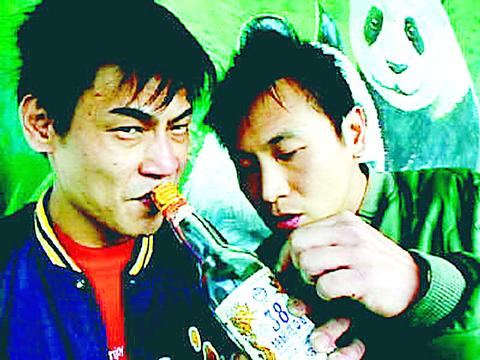
Ho Ping's fourth feature film was the only Taiwanese film selected to participate in this year's "Berlinale." Not as famous as Taiwanese directors like Ho Hsiao-hsien (
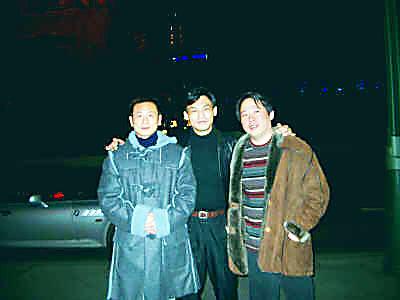
PHOTO: YU SEN-LUN, TAIPEI TIMES
"I like this film a lot, especially the second time I saw it," said Dorothee Wenner, committee member of the International Forum of Young Directors of the Berlin Film Festival.
The Rule of the Game tells a simple story about murder, cheating and anxiety revolving around two characters. As the film's Chinese title says, the two men dig holes.
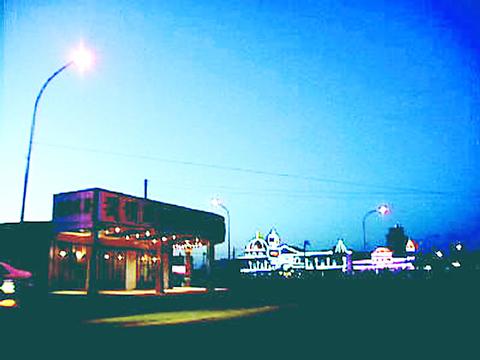
The film begins with a scene deep in the woods on a foggy night, with Turtle and Chewy -- played by Hsia Ching-ting (
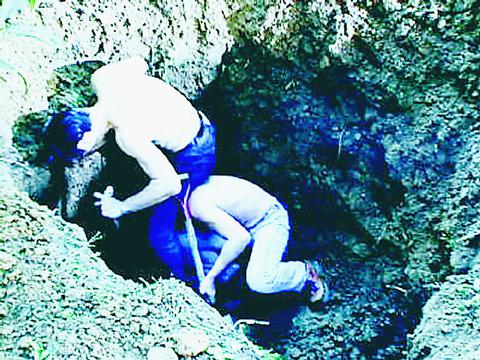
Flash back to three days earlier where the story begins with Chewy's bizarre theory of digging holes. "Killing is easier than burying, stealing is easier than laundering money. A successful murder depends on how well you dig a hole. ... Taiwan has about 3000 reported missing persons, most of them are actually in holes." Chewy shares his theory with his friend since high school, Turtle, who is bent on getting back at a businessman named Will, who cheated him out of millions of dollars.
Chewy is more excited about his plan for digging holes, than he is for helping Turtle. The two get shovels, find a good spot and prepare a big hole for their victim. Will, as it turns out, has other enemies and has been abducted by his wife and her boyfriend. Turtle then ends up killing a hitman who returns home and catches him having sex with his wife. But now, after burying the wrong guy, Turtle and Chewy have to dig another hole.
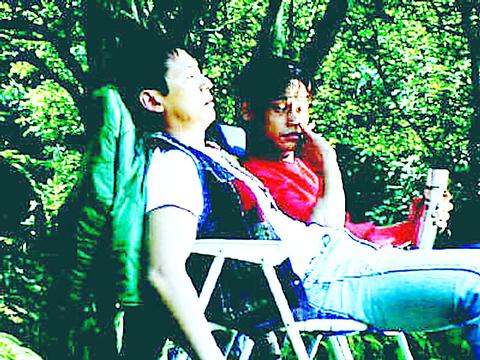
A comedy filled with irony and absurdity, The Rule of the Game is a simple story told with with witty dialogue reflecting the anxious minds of Taiwanese -- every character seems willing to die for money. It is also a film with exotic although stereotypical scenes of organized crime in Taiwan: vulgar, bright colored shirts, Mercedez Benzes and KTVs. There is even a very detailed and provocative scene about how to assassinate someone in a KTV parlor.
Ho's direction in this film is straightforward, "less technique, more drama," he said. His previous films Shiba (
Chang and Hsia as Chewy and Turtle are the film's greatest assets. They are like a two-man Taiwanese version of Reservoir Dogs, with all the filthy language in Mandarin and Taiwanese.
"My part is basically a man with a screwed-up mind. He is a Taiwanese businessman who failed in China. The second generation of mainlanders, he considers neither [Taiwan nor China] home and feels lonely a lot," said Chang at the film's question-and-answer session. "Chewy is the least greedy guy in the film, but with the most serious problems. He is not pursuing money, sex, or a better future. He's lost all hope and desire." said Chang.
Chang, who also starred in Wolves Cry Under the Moon said he has worked with Ho so often in film and television that they had a tacit understanding of one another. "Acting in this film is a special a thrill because I can improvise a lot with the dialogue," he said.
Indeed, underneath the surface of a comedy about killing and gangs, there is a subtext Ho is wanting to express about cheating, wandering and losing one's sense of belonging.
"This movie is also about destiny and the irony of my generation of Taiwanese. When the hole is filled, it becomes a grave. Perhaps Chewy should dig a hole for himself, a well-planed hole where he could lie down and rest with comfort and dignity," said Ho.

May 26 to June 1 When the Qing Dynasty first took control over many parts of Taiwan in 1684, it roughly continued the Kingdom of Tungning’s administrative borders (see below), setting up one prefecture and three counties. The actual area of control covered today’s Chiayi, Tainan and Kaohsiung. The administrative center was in Taiwan Prefecture, in today’s Tainan. But as Han settlement expanded and due to rebellions and other international incidents, the administrative units became more complex. By the time Taiwan became a province of the Qing in 1887, there were three prefectures, eleven counties, three subprefectures and one directly-administered prefecture, with

It’s an enormous dome of colorful glass, something between the Sistine Chapel and a Marc Chagall fresco. And yet, it’s just a subway station. Formosa Boulevard is the heart of Kaohsiung’s mass transit system. In metro terms, it’s modest: the only transfer station in a network with just two lines. But it’s a landmark nonetheless: a civic space that serves as much more than a point of transit. On a hot Sunday, the corridors and vast halls are filled with a market selling everything from second-hand clothes to toys and house decorations. It’s just one of the many events the station hosts,

Among Thailand’s Chinese Nationalist Party (KMT) villages, a certain rivalry exists between Arunothai, the largest of these villages, and Mae Salong, which is currently the most prosperous. Historically, the rivalry stems from a split in KMT military factions in the early 1960s, which divided command and opium territories after Chiang Kai-shek (蔣介石) cut off open support in 1961 due to international pressure (see part two, “The KMT opium lords of the Golden Triangle,” on May 20). But today this rivalry manifests as a different kind of split, with Arunothai leading a pro-China faction and Mae Salong staunchly aligned to Taiwan.

Two moves show Taichung Mayor Lu Shiow-yen (盧秀燕) is gunning for Chinese Nationalist Party (KMT) party chair and the 2028 presidential election. Technically, these are not yet “officially” official, but by the rules of Taiwan politics, she is now on the dance floor. Earlier this month Lu confirmed in an interview in Japan’s Nikkei that she was considering running for KMT chair. This is not new news, but according to reports from her camp she previously was still considering the case for and against running. By choosing a respected, international news outlet, she declared it to the world. While the outside world